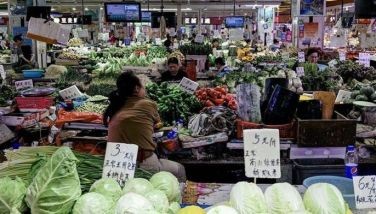ADB: ‘Country stigma’ to affect remittances
MANILA, Philippines — Remittances worldwide, especially those flowing into traditional labor-sending countries like the Philippines, will take a hit through a “country stigma” attached to workers coming from areas struggling to contain the spread of COVID-19, the Asian Development Bank (ADB) said.
In a blog entry, Werner Liepach, director general of ADB’s Central and West Asia Department, and Guntur Sugiyarto, principal economist of ADB’s Pakistan resident mission, said while migration and remittances have proven to be “very resilient” in past global crises, the new coronavirus pandemic is changing this as labor-importing states may mark countries with weak capability to control the spread of the virus among its population.
“The pandemic has put a “country stigma” to the migrant workers from areas that have been struggling to cope with the pandemic and this may prevent them from entering other countries. Worse still, they may even be prohibited from exiting their own countries by their governments if the pandemic has become uncontrollable.
If blocked from finding work overseas, there is no guarantee that the migrants can find an alternative job, which have become scarce,” the ADB economists said.
Migrants may also be most likely to be excluded in the list of targeted groups for government incentives and social programs, as public resources become strained.
The impact, they said, could be “devastating” because of the effect of diminished remittances on poverty reduction and educational attainment in developing countries.
Asia has been contributing to more than 40 percent of total migration worldwide, with South and Central Asia as main sources.
For traditional migrant-sending countries, these overseas workers have constituted more than 10 percent of their labor force.
“The pandemic has created an unprecedented crisis for overseas workers and the remittances they send home. But with the right actions by governments, it could also be a chance for long-term change,” the authors said.
Governments of sending countries, they said, must work with their international and domestic counterparts to facilitate re-entry of migrants to the destination countries.
This can be done by ensuring that the migrants are healthy and ready to be deployed using special transportation, such as chartered flights, to resume their work.
“This will require high-level diplomacy and strategic action at the country and regional levels,” the ADB economists said.
For workers waiting to be redeployed overseased they said governments must make use of migrants as part of the recovery program in the domestic economy.
This can be done by employing this productive workforce and using the new knowledge and skills that the migrants acquired abroad. This may entail additional resources to help small and medium enterprises hire these workers, which will create much bigger multiplier effects in the economy.
“This approach is called a utilization of ‘social remittance’, and it can also promote innovation. If governments get this right, re-deployment of these workers would no longer be needed and they could be integrated into the domestic economy. This would strengthen the workforce and improve overall productivity,” the authors said.
- Latest
- Trending































